Peter MALONE
Saturday, 18 September 2021 19:48
Return of Count Yorga
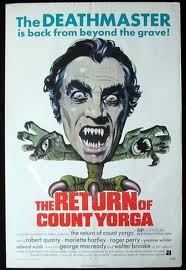
RETURN OF COUNT YORGA
US, 1971, 97 Minutes, Colour.
Robert Quarry, Mariette Hartley, Roger Perry, Yvonne Wilder, Tom Toner, Rudy De Luca.
Directed by Robert Kelljan.
Count Yorga, Vampire and the Return of Count Yorga were extremely popular in 1970 and 1971. While the original is quite good, its successor was even better. The films star Robert Quarry and he made an excellent vampire. Everybody loves a scare; we like our capacity for fear and fright to be preyed on, especially in a film, from which we know we can walk out safely into real life daylight. Count Yorga Vampire is very frightening at moments, especially in the last fifteen minutes and its end with a voice laughing at the audience from a dark screen. The film doesn't take itself too seriously and so succeeds within its own limits. The Return of Count Yorga is a much more polished variety of the same thing.
1. The appeal of horror film and their conventions? Audience expectations? The film's success in using these conventions and catering for expectations?
2. The transfer of English and European conventions to America? A successful transfer? Vampires in modern America?
3. The value of this film as a sequel? Audience expectations from the original? The details of the personality of Yorga, the details of his myth? The elements of satire and parody in the presentation of the vampire film?
4. The emphasis on techniques: the playful opening with Tommy, and then the living dead arising? The contrast of the living dead with the people at the orphanage? Their wins and the speculation about the wins? The hand at the window, techniques of Yorga in flight towards his victims, the atmosphere of menace? The living dead?
5. The focus on Cynthia and audience identification with her? As a person her role in the orphanage, her fears, the fascination for Yorga and his holding her? Her fear? The ending and her being victimised?
6. The personality of Count Yorga and his style? The initial appearance, solemnity, his vampire acts, sinister behaviour, his murders, yet the irony of his watching television? The appropriate climax of a fight between the hero and the vampire? His death?
7. The film's use of Tommy and the innocent child as a sinister character? His lies, leading people to death?
8. The massacre of the family, the horde of living dead who paid court to Yorga? Their final menace throughout the house at the end?
9. The contribution of the characters of Jennifer and her being mute, her desperation to communicate? The minister and his lack of awareness, especially before his death. The doctor and the police?
10. How appropriate was the climax? The fear of the police, the doctor, the death of the brutal servant, the final vampirism? The irony of the doctor and Cynthia at the end? A successful example of its kind?
Published in Movie Reviews
Published in
Movie Reviews
Tagged under
Saturday, 18 September 2021 19:48
Zebra in the Kitchen
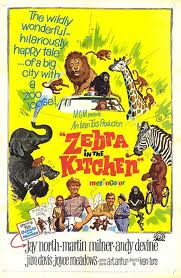
ZEBRA IN THE KITCHEN
US, 1965, 90 minutes, Colour.
Jay North, Martin Milner, Andy Devine, Joyce Meadows, Jim Davis.
Directed by Ivan Tors.
Zebra in the Kitchen is a slight family film, very popular in the mid-1960s – but does not look so good now. The title is something of a misnomer, the zebra appearing only in the animated credit sequences along with a whole lot of other animals intruding into domestic scenes. The acting is also somewhat limited – with Jay North, television’s Dennis the Menace, as a boy who has a pet mountain lion at his home in the countryside and who is upset when the family has to move to the city and he brings his mountain line with him.
The framework of the film is about another little boy who has a pet bear and does not want to give him up so the manager of the local zoo, played by veteran Andy Devine, tells him a story about the boy with the mountain lion and what happened, with the result that the little boy is willing to give up his bear to be cared for in the zoo.
Children can probably identify with the intense friendship of the boy with his mountain lion, but adults will be rather impatient with his attachment to his pet, his behaviour, and, ultimately, his wilful freeing all the animals of the zoo so that they wander around the town, causing some G-rated mayhem. And he gets off rather lightly with a reprimand and the promise to work at the zoo, something he was doing already, taking every opportunity to see his mountain line. Martin Milner is the doctor at the zoo who is campaigning for improvements but who is thwarted by members of the city council, especially one counsellor who is dead-set on not giving the zoo any money and getting rid of the doctor. The doctor has a very attractive assistant who is skilful at the zoo and care of animals. Ultimately, Andy Devine takes the blame for freeing the animal so that he can protect the boy. He is ultimately praised by everyone for his kindness.
The film was directed by Ivan Tors, a producer of a great deal of family television in the 1960s and 1970s. He was responsible for Flipper amongst other programs.
1. An appealing family film, the response of children to the animals, identifying with the boy, the adventures and comedy with the animals? Adult responses?
2. The framework of the story, little boy with the bear, not want to give him up, Mr Hawksbill telling him the story about Chris and the mountain lion, the concern of the parents, the boy ultimately giving up the pet for the zoo?
3. Chris and his family, with the mountain lion, the news that they had to move to the city, the cousins and their help, his smuggling the animal onto the truck, into the house, and its running in and eating the food at the neighbour’s house? In company with the pet dog? Chris’ sadness about the pet, going to the zoo?
4. Meeting Dr Hartwood and his assistant, the discussions about the mountain lion, in the cage? His coming back to see this pet? The rest of the animals and the dingy aspects of the zoo? The animals’ lack of energy? His being offered the job to assist Mr Hawksbill? His enjoying it? His parents happy with him? The visit with his cousin to the zoo?
5. His being upset about the animals and their being caged, his wanting to set them free? His opening all the cages? The animals wandering freely through the town, and elephants, lions and the rest of the animals? The comedy of the human response? Yet the dangers?
6. The visit of the Council meant the zoo, Dr Hartwood and his forthright views? The counsellor wanting to sack him?
7. Dr Hartwood and the deadline to get the animals back, the role of the police, the stun guns, the big game hunter wanting to kill the animals, the difficulties, the ultimate success? Chris and his hiding with his pet?
8. The court, the judge, Mr Hawksbill taking the blame, in prison, is being justified in the court? The admiration of the judge Mr Mark? The penalty for Chris and his working with the animals?
Published in Movie Reviews
Published in
Movie Reviews
Tagged under
Saturday, 18 September 2021 19:48
Fill the Void
.jpg)
FILL THE AVOID
Israel, 2012, 90 minutes, Colour.
Hadas Yaron, Yiftach Klein, Irit Sheleg.
Directed by Rama Bushtein.
This film is different from the usual stories from Israel. While other films treat the Orthodox Jews and their stories, this film was written and directed by a woman who converted to the Orthodox and has lived within its strict rules and traditions. She is telling the story of a young woman from inside the community.
The film, photographed in authentic locations in Tel Aviv, brings the life and lifestyle of the Orthodox to the screen quite vividly. This is very patriarchal society. Women are subject to the decisions of the men. And this is particularly the case with arranged marriages, the theme of this film.
Shira is a young woman with some energy, studying the traditions, well-informed, but also faced with the prospect of women in the community, her marriage. The film opens with a slightly bizarre episode in a supermarket where a marriage broker contacts the young girl and her mother by phone to indicate that a prospective husband is in part of the supermarket and that they should approach him.
However, a severe complication arises when the young woman’s older sister dies in childbirth. Her husband is expected to marry again, especially for the child, and for a moment he intends to go to Belgium for a new wife. Shira is attracted to him but the thought of her marrying her sister’s husband with the sexual implications somewhat repels her.
Her father is a rabbi and on feasts holds court with people coming to him for advice and, especially, men coming for financial assistance. He runs a strict household and has views on the marriage of his younger daughter. The strong-minded mother is busy running the household but also concerned about her daughter.
There is also a rabbi of higher rank, consulted by many people, who gives advice to the young woman. In discussions with the widower, Shira finds more sympathy for him, especially as he breaks down, with tears for his situation, his dead wife and for his child.
Many audiences watching this film will feel somewhat alienated from the beliefs and the traditions of the people, the marriage arrangements, the situation of women. However, the writer-director presents the situation, takes it for granted, as, finally, does Shira.
A film insightful for its Orthodox audience, a film to be observed by those outside the community and by those who sympathy is not immediately for the community.
Israel’s Academy Award nomination for Best Foreign Language film for 2012.
1. The claim from the film, nominated for Oscars?
2. A female director and female perspective? An orthodox director and her perspective on life and her own culture?
3. Audience attitudes towards the orthodox? In Tel Aviv? Within Israel? Outside Israel? Foreign audiences seeing the community and its customs and traditions as remote and strange?
4. Tel Aviv, the area, the homes, streets, the meetings of the Rabbis, the offices, synagogues?
5. The separation between men and women? Women’s lives? Subordinate to men, arranged marriages for the men, the wives submissive? The traditions, the clothes, the married women and their covering their area? The rituals? The feast of Purim? The place of the men, the Rabbis, leadership? The clothes, hats, the head? The meetings, the prayers, the singing? The women watching from outside the room? The acceptance of these traditions?
6. The musical score, the music for the Psalm, the chant?
7. The opening, the two women, mother and daughter, the phone to the broker, the supermarket, going to the dairy area, watching the young man? Shira and her hopes? Seeing the man, only glimpses, the later meeting, the orange juice, his lack of personality?
8. Shira at 18, accepting the way of life, with her mother, with her aunt, with the marriage broker? Her sister and her pregnancy? Frieda and her friendship? Life and expectations, to be married?
9. The sympathetic portrait of the aunt, her having no arms, never married, the possibility with the disabled man, her not liking him, covering her hair like a married woman so that there were not intrusive questions? Her helping her sister? Care for Shira?
10. The strong personality of her mother, her father and his clients, the feast of Purim and his listening to the petitions, fostering marriage and children, handing out the cash, the man with the wife with mental problems, his rejecting the money? Money as the solution?
11. The old rabbi, at the table, the men around him, listening, giving advice, the woman intruding and asking for advice about the oven?
12. The sister, her pregnancy, giving birth, her death? Her husband and the effect on him? Grief? The birth of the child?
13. Yochay, the need to marry again, the need for looking after his child, the arranged marriage in Belgium, the possibility of his going? The plan falling through, Shira to be his next wife? Talking with her, her repugnance, the reasons, missing the initial joy of marriage, sexual relationship with her sister’s husband? Yochay, advice, his drinking, weeping, the effect on Shira?
14. Frieda, the suggestion that Yochay marry her, his rejection, are being hurt? The joy of the engagement with the broker, the marriage?
15. Shira agreeing, if Yochay agreeing, the parents and the visiting of the rabbi, Shira and the note? The build-up to the engagement, the wedding, Shira and her weeping, her joy? Her mother taking her down, the ceremony? Yochay and his joy?
16. The aftermath, Yochay and Shira in the room – and the moment of the ending, Shira and the anticipation of the marriage? The audience and its
wondering what would happen?
17. An insight into an exclusive community, looking in on itself, marriage within the community, suspicions of the outside world and its modernism? And empathetic view of this community?
Published in Movie Reviews
Published in
Movie Reviews
Tagged under
Saturday, 18 September 2021 19:48
Big Dollhouse
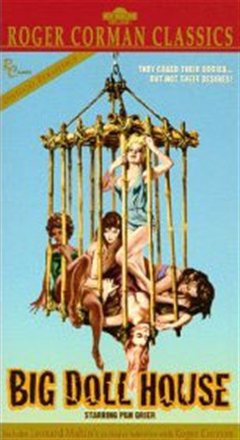
BIG DOLLHOUSE
US, 1971, 95 minutes, Colour.
Judy Brown, Pam Grier, Sid Haig.
Directed by Jack Hill.
Big Dollhouse is an exploitation film of 1971, a period which is often referred to as Grindhouse, and given homage by Robert Rodriguez and Quentin Tarantino in the double bill movie of that name.
In comparison, this film is quite restrained. Filmed in the Philippines and manipulating its storyline to fit into that country, it is a story about a women’s prison where, in fact, all the prisoners are white Americans, the guards being Filipinas, and the warden a butch Germanic type. There is a rather meek and mild doctor on the staff. The other two main characters are, again, white Americans who deliver fruit and vegetables to the prison and have sexual exploitation in mind.
Acting talent was not particularly required from any of those in the film. The main style of performance is posing and posturing, especially with the group of women in a cell as well as in the shower block. The women are introduced when a newcomer, accused of murder, is brought into the prison, determined to escape.
Some of the women are sullen, magazine-photo pouting looks. Another is drugged-out and all of them look as if they are models for men’s magazines. There is a lot of tough talk and clashes with the warden.
The doctor is fairly ineffectual, but the two men with the vegetables and supplies for the women in their cells have intentions which are less-than-noble-sexual.
However, before anything too salacious can take place, some of the women take the warden as a hostage, bring along the doctor, use the men and their truck for an escape. The warden, trussed in the back of the truck, pulls a gun on one of the women – but it is empty and she herself becomes the victim. Just as we are wondering what could possibly happen, a group of rebel soldiers appear on a hill and there is a shootout between the women and the soldiers, the soldiers retreating while some of the women are killed. One of them, more demure than the others, has written a letter to her lover in exile and committed it to the central character who rushes on to a very ordinary road and is picked up by a truck passing by – which is to take her back to prison.
Of historical interest, Pam Grier appears as one of the prisoners and actually sings the song over the initial credits. The director, Jack Hill, was a writer-director of exploitation films and was to go on to make Coffy and Foxy Brown with Pam Grier.
Published in Movie Reviews
Published in
Movie Reviews
Tagged under
Saturday, 18 September 2021 19:48
Road to Rio
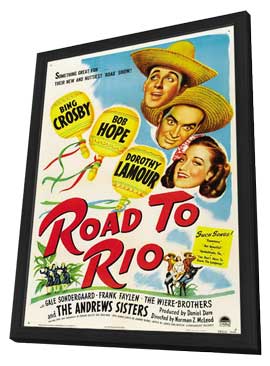
ROAD TO RIO
US, 1947, 103 minutes, Black and white.
Bing Crosby, Bob Hope, Dorothy Lamour, Gail Sondegaard, The Andrews Sisters, The Wiere Brothers.
Directed by Norman Z.Mc Leod.
In the early 1940s, a very popular series of comedies began, the Road series, to Singapore, Morocco, Zanzibar. They were star vehicles were Bing Crosby and Bob Hope, teaming up with Dorothy Lamour. There were later roads to Utopia, then Rio and, in the 1950s, to Bali. The last road film was in 1962 with Road to Hong Kong, this time Joan Collins having the key role but with a guest appearance by Dorothy Lamour.
Bing Crosby had been a popular singer from the early 1930s and had appeared in quite a number of films. During the 1940s, he would appear in much more upmarket films like holiday in Holiday Inn and Blue Skies as well as winning an Oscar for Going My Way. Bob Hope had established himself as a screen presence, specialising in types who had more confidence in themselves than was merited and often played the character who was something of a failure, especially with the girl at the end. Crosby and Hope often make remarks about each other in many of their films in the succeeding years.
This is a story of two troupers, song-and-dance men, who could also play instruments, with a map of America at the beginning and Crosby with his conquests of women in various locations with hope always warning Crosby against women. Eventually they encounter a rich young woman who is looked after by an evil aunt, Gail Sondegaard. In escaping from a performance fiasco, they find themselves on a ship bound for Brazil, concerned about the young woman, Dorothy Lamour, but also getting the opportunity to perform on the ship – a rather benign captain treating stowaways.
While there are some very enjoyable song and dance routines, comic touches with Hope, romantic with Crosby, comic with the Wiere Brothers as a group of Latin American players, there is a standout performance on the ship with the Andrews sisters who happened to be on board, You Don’t have to Know the Language.
Once in Rio, they are concerned about the girl, smuggling her off the ship. However, the evil aunt and her henchmen are onto the two of them and the aunt uses her ability to hypnotise everyone to try to get Crosby and Hope to kill each other in a duel. This also explains the contradictory behaviour by Dorothy Lamour. Finally, there is some business about documents in a safe which the duo is able to retrieve and prevent a contrived marriage with a hypnotised Dorothy. The finale includes a song in dance routine with Hope disguised as a rather large lady and the two thugs knocking each other out, hypnotised, playing patter cake.
Dorothy Lamour gets the opportunity also to sing. All in all, the material is humorously routine, especially for the three stars, but they show an exuberance which carries the audience along. Historically speaking, Road to Rio is typical of so many of the comedies from Paramount Studios in the 1940s.
Published in Movie Reviews
Published in
Movie Reviews
Tagged under
Saturday, 18 September 2021 19:48
Wild Bill/ 2011
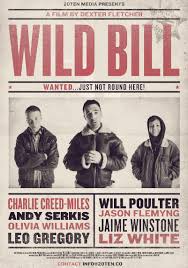
WILD BILL
UK, 2011, 95 minutes, Colour.
Charlie Creed- Miles, Will Poulter, Andy Serkis, Olivia Williams, Jason Fleming, Sean Pertwee, Leo Gregory.
Directed by Dexter Fletcher.
Wild Bill is an interesting variation on British gangster films, although a number of members of the cast of those films also appear here in similar roles. However, despite any violence, this is a much more gentle film, with a sense of humanity. It was directed by actor Dexter Fletcher and dedicated to his own father.
Charlie Creed- Miles portrays Bill, who has just served an eight year sentence in prison, taking the rap for various drug dealers in his part of East London. As he comes out of prison, he goes home, finds that his wife has left with another man long since and that his two sons, played very well by Will Poulter and Sammy Williams, fending for themselves, the younger boy truant from school and dealing drugs in the neighbourhood, the older boy working on a building site. The older boy strongly resents his father who intends to move to Scotland but is forced to stay in London because of his parole officer, played by Olivia Williams.
The film is about Bill coming to terms with his situation, being warned by the police to keep clear of non-criminals, tangling with a prostitute friend whom he supports, meeting with his parole officer, discovering what his youngest son was doing and helping him out of the situation, a physical confrontation with the criminal gang. The film is also interesting in seeing the development of the two boys in themselves and in relationship to their father and experiencing some fathering – which is a key message of the film.
The film has an authentic feel, is well acted, bring some of the stereotyped characters to life. Charlie Creed Miles is very good and Will Poulter very good indeed. But it is the sense of humanity that takes this film a notch higher than many others of its kind.
1. The British film industry and its many gangster films? This film using the traditions, yet breaking free from many of them?
2. The title, with the focus on Bill, his nickname from the past, the effect of prison on him, eight years, taking the rap for the others, his being much more subdued? His lack of education? No definite plans for the future, meeting up with friends, planning to go to Scotland? Going home, finding that his wife had left and gone to Ibiza with another man? The initial reaction of his sons, the smaller boy really not remembering him, the older boy and his fierce resentment? The visit to the parole officer, her sympathy, making clear that he had to stay in London, that he had to look after the boys or else they would be taken into care? The visit of the supervisor, her looking at the house, the situations, the dirty toilet…?
3. The two boys? Jimmy, his age, not remembering his father, truancy from school, the threats from the teacher, his friend and they’re distributing the drugs together, round the neighbourhood? His stealing the money from Steph and Dean taking the blame? Getting into trouble with the gang, the police, putting the drugs down the drain, the gang demanding money from him, his reason to stealing the money from Steph, the continued threats, not letting him go? His father discovering this, finding Jimmy hiding on the roof, where his father had hid when he was young? the lyric scene with the paper planes? His getting Jimmy to give the money back to Steph? His going to the bar, the confrontation with the gang, the barman helping him with a weapon, the fight, the brutality against him, the barman tripping one of the gang, Bill overcoming the enemies, going home, reconciling Dean with Steph, his being questioned by the police, taken by the police? The finale and the car, the close-up on Bill, his face, serious, gradually smiling, asking the driver if he was a father, being proud of his relationship with his sons?
4. Dean, his age, having to take responsibility, the help from the neighbour so that they would not have to go into care? His work on the building site, being late, the reprimands from the boss? His going to meet Steph, the men encouraging him? His relationship with her? The visit to the house, her father turning up, the sexual encounter and its failure? Steph and her reaction to the stolen money, hostility towards Dean? The return of the money, Steph coming back, the happy reunion, sexual? His aggressive attitude towards his father, harsh words, walking out, the episode with Roxy and her being in the nbed for his birthday? Ousting her? His later compassion for her and allowing her to stay? Not wanting her to be a substitute mother? The final relenting? Jimmy and the scenes with his father, sharing, talking, the meal cooked at home, going out with Roxy for the Chinese food? His discovery of his love for his father?
5. The crooks around East London, drug deals, the sense of their own importance, violent, peer pressure? The boss, his car, the interviews, the pressure on Bill? His coming to meet Bill, Bill taking the rap for him? The minor criminals? Their codes, greed, using children for drug distribution? The final fight in the bar?
6. Roxy, on the game, in the bar, Bill getting drunk, the night together, meeting in the supermarket, in bed for Dean, the visit of the supervisor and her not going into the bedroom? Roxy and her support of the children, at the end?
7. The inspector of the homes, her consideration, expectations for the children? The parole officer and her support?
8. A glimpse of life in East London, young men going to jail and spending years there, trying to reconstruct a life, to reconnect with their family, with their children? Bill and his success?
Published in Movie Reviews
Published in
Movie Reviews
Tagged under
Saturday, 18 September 2021 19:48
20,000 Years in Sing Sing
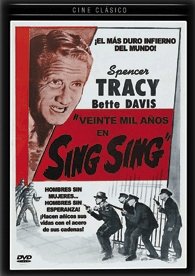
20,000 YEARS IN SING SING
Spencer Tracy, Bette Davis, Arthur Byron, Louis Calhern.
Directed by Michael Curtiz.
20,000 years in Sing Sing seems a very long long time, especially in such a brief and fast-paced film as this. The device is to show at the beginning – and then dramatically at the end – the prisoners lining up and a succession of numbers coming across the screen to indicate the length of their sentences.
This is a very good prison film, with a star turn from Spencer Tracy doing something of James Cagney role. He portrays a brash young criminal who thinks he will have an easy time in prison with the help of his backers in New York. However, there is a very strong warden, played with dignity by Arthur Byron, who is strict and is able to teach the prisoner some lessons. When his girlfriend, played by Bette Davis, is injured in an accident, the warden allows his prisoner to go to visit her on compassionate leave with the promise that he will return. While he is on leave, he gets into a fight with a crooked lawyer, an early role for Louis Calhern, and Bette Davis shoots him. He returns to prison but is condemned to death for the murder, not allowing Bette Davis to take the blame, and goes to the electric chair.
Spencer Tracy is interesting in the central role, not like the roles he was to have in later films, winning two Oscars five and six years later for Captains Courageous and Boys Town. Bette Davis was a quickly rising star and won an Oscar two years later for Dangerous.
The film is expertly directed by Michael Curtiz, later an Oscar-winner for directing Casablanca. He shows an elegant style, especially for a film of 1932.
1. An impressive film of 1932? Pre-code? Issues of crime in the cities, crime and punishment, corruption and the law, relationships and sexuality?
2. The title, the focus on the prison in Sing Sing, the train going along the Hudson, the town of Ossining, the realism in filming the prison, the exteriors, the yards, the cells?
3. The title and the device of having the prisoners and the numbers of their sentences coming on screen, and the recapitulation at the end as Connors went to the electric chair?
4. Connors, early 30s, Spencer Tracy’s screen presence and performance, on the train, with the journalists, his bravado, Joe Finn and his support? The arrival at Sing Sing, the police, the celebrity, going inside, his becoming just one of the prisoners?
5. The warden, his personality, stern, just? His reputation? The confrontation with Connors, explaining equality, laying down the regulations? The issue of the uniform, Connors complaining about it being too large, taking it off in a scuffle with the police, not wanting to wear a uniform and the warden allowing this, in the yard in his underwear? Connors and his not wanting to work, the warden allowing this, Connors sitting in his cell for months, wanting to get out and work, the vigour in working?
6. Joe Finn, his interview with the warden, offering money for Connors? His double-dealing, with Fay, the money, her accident, his coming to visit, the bribe, the fight with Connors, Fay shooting him?
7. Connors in prison, his change of attitude, with fellow prisoners? The test and his aptitude for his work, playing dumb, spilling the ink, having to sit in it, his intelligence? The scene with the graduate from the University and his intelligence?
8. The situation with Fay, the warden putting Connors on his honour, his promising to come back, meeting Fay, her being ill, the fight with Joe Finn, his death? Connors wanting to escape the country, Fay giving him the money, his arranging the boat? His return? His return?
9. His coming back, the warden and the adverse press, offering his resignation, the justifying of his compassion policy?
10. The arrest, the court case, Connors found guilty, on death row? The visit of Fay and her wanting to take the blame? The warden believing her? The visit of the priest, playing handball with Connors, wanting to do something spiritual, the prayer with him at the end?
11. In a period of gangsters and films about gangsters, a message film about bravado and about not flouting the law?
Published in Movie Reviews
Published in
Movie Reviews
Tagged under
Saturday, 18 September 2021 19:48
Albino Alligator
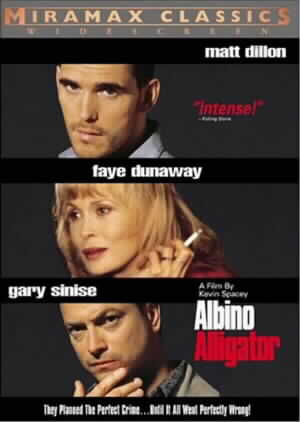
ALBINO ALLIGATOR
US, 1997, 97 minutes, Colour.
Matt Dillon, Faye Dunaway, William Fichtner, Gary Sinise, Viggo Mortensen, Joe Mantegna, Skeet, Ulrich, John Spencer, M. Emmett Welsh.
Directed by Kevin Spacey.
One has to listen carefully to pick up the story told about the albino alligator which, in Louisiana (this is a New Orleans story), is offered as a sacrifice for the safety of others. This allegorical title is used for actor Kevin Spacey's directorial debut. Spacey has shown himself a versatile actor, but especially playing villains as in Consenting Adults, but best in his Oscar winning performance in The Usual Suspects and in Seven. He has chosen a crime thriller and siege as his first film.
While shot in widescreen, this is an interior piece, most of the action taking place in a basement bar. A robbery goes wrong and the criminals detour to a bar only to find that the police who, they think, are chasing them, are in fact after someone else. This is a film of character more than action and the cast is very good indeed, led by Matt Dillon in one of his best roles. Gary Sinise is his brother and Faye Dunawaye works in the bar. Audiences expecting a shoot-em-up will find this only briefly. It might be described as an `art-house thriller'.
1. The title, the explanation, intervention and sacrifice?
2. New Orleans, the city, streets, the warehouse, the chase and crash, the interiors? Television programs from outside? The musical score?
3. The set-up, the difficulties, taking the car, the men, the chase, the crash, hiding, the money, the trio in the car, Milo and his being injured? Taking refuge in the bar? The plan?
4. The bar in the basement, claustrophobic, Dova as leader, Milo his brother, Law and his driving, participating in the plan? His brutality and violence? Milo and his wounds, his needs? The patrons, the set-up in the bar, the hostage situation?
5. Dino, the owner, his manner with the intruders, talking, defying them, their brutal attack, his death?
6. Janet, continually confronting Dova, the challenge? Daniel, quiet and in the background, wanting to be cooperative, with Janet, her being his mother, her wanting to protect him? John, the patron, drinking, his being shot?
7. Guy, sitting quietly in the bar, bespectacled, his briefcase, not saying much, his reactions, the TV information about who he was, gun purchase, the agents after him, the police siege really for him rather than for the trio, his lies, the attack on him, his offering to help, sitting at the table, standing up to confront the agents, his death?
8. The atmosphere of tension, as in such films as The Petrified Forest? Contrived, the long takes on the faces of the individuals, their speaking, their silences? Violence and deaths?
9. The television, the continued information?
10. The agent outside, the large squad, holding off, the assistant and the top agent controlling him? Hearing the shots, going into the bar?
11. Law, his continued brutality, tough stances, defiance, obeying Dova? His finally being killed?
12. Milo and Dova’s promise, on their mother? Keeping to the plan, his wounds, his not wanting killing, slitting his wrists, the effect on Dova?
13. The police and the agents rescuing the hostages, Janet and Daniel surviving, the threat that they should kill Jack, his death? The irony that Dova should be considered one of the hostages being saved? And the audience left with that?
14. The film as a psychodrama with a gangster, police and brutal setting?
Published in Movie Reviews
Published in
Movie Reviews
Tagged under
Saturday, 18 September 2021 19:48
500 Days of Summer
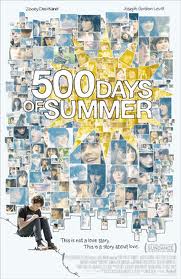
(500) DAYS OF SUMMER
US, 2009, 95 minutes, Colour.
Joseph Gordon Levitt, Zoe Deschanel, Chloe Grace Moretz, Geoffrey Arend.
Directed by Marc Webb
Summer is the name of the young woman at the centre of the yearnings and love of greeting-card text writer, Tom. And not all of his days are summery. Sometimes autumn, sometimes some winter chill.
A voiceover introduces us to Tom and his 500 days of love for Summer. There is a wry tone in his voice. We see a split-screen collage of Tom and Summer each growing up. We see Day 1 where Tom first sees Summer while he is in a staff meeting and she comes in, the new secretary of the boss. For him, it is love at first sight, the absolute sureness that she is the perfect woman for him, forever. We move ahead quite a number of days and find Summer suggesting they not see each other for a while. What could have gone wrong?
This toing and froing between days (signalled on screen) is how the film works. We share the lyrical days with Tom (and the director uses some nifty screen devices to indicate this, including an imagined musical dance number in the streets of LA, complete with an animate bluebird of happiness). We share the grim and depressed days with Tom, including some glum karaoke turns. We share the hopes that all will be well again as Tom is invited to a party by Summer and the screen splits again with 'expectations' subtitled on one side and 'reality' on the other – and never the twain do meet.
Zooey Deschanel glows as Summer. We see her through Tom's eyes and are charmed. We understand how he could fall in love with her, be so happy just being with her. But, we are probably doing the same thing as Tom all the time: expectations/reality. One of the reasons the film works well (especially for young adults who are idealistic about falling in love or who are sceptical that such a thing as love could exist) is the performance of Joseph Gordon Leavitt. He is more real and credible, even in his idealism, than so many of the young, good-looking types who pass through such films and pass out of our memories. He can act. He makes us see through his eyes and share his feelings. (Perhaps a female reviewer might not agree with this and might see everything through Summer's eyes: 'expectations/reality'.)
The film has a good-feeling screenplay that has its sharp moments and its crass moments but is far more forgiveable than most.
After the film is over and we have experienced Tom's life, we still need to check expectations/reality.
1. A romantic comedy with a difference? The possibilities for love? for unrequited love? Expectations and reality?
2. The American city, the young adult world, apartments, offices, restaurants, parks? The musical score? The scene of the musical number, led by Tom, in the streets of New York?
3. The title, the tone? Summer as the young woman of Tom’s dreams?
4. The structure, the initial voice-over, its tone, the list of days, the split screens for Tom and Summer growing up? The back and forth to the various days?
5. The introduction to Tom and Summer, childhood, parallels, Tom and his sister, Summer and her life?
6. Tom at work, his architecture degree, not following it up, working on greeting cards, the examples that he gave of texts, Summer as the new secretary, working with his boss?
7. Tom seeing Summer, his initial response, love, infatuation, his heart? Summer and her responses? Likeable, sharing with Tom?
8. Tom, his friends, McKenzie? and Paul, meeting with them, their advice, their perspectives on Summer? And what he should do? McKenzie? at work? Paul and his questioning? McKenzie? and is acting up, drinking, talking with Summer?
9. Tom talking with his sister, her age, her wisdom, frankness, her being a sounding board? Intercutting the narrative with his meetings with his sister?
10. The changing days, Tom and Summer, up and down, comfortable together, talking, eating, drinking, Tom revealing himself, Summer gradually rests revealing herself?
11. Tom, his love, being hurt by Summer, asking her about love, Summer and are not believing in love, wanting her autonomy? The effect on Tom – and the humour of the karaoke songs, contrasting with Summer and her singing?
12. The boss, his interest in Tom, the interview, firing him? Tom, the examples of his architecture, looking at the buildings, going back to this work?
13. Summer, her wedding, Tom hurt by her not telling him, her apology?
14. Tom having to learn, Summer amazed at his attitude?
15. The new interview, the girl waiting, the attraction, and the ironic voice-over at the end?
Published in Movie Reviews
Published in
Movie Reviews
Tagged under
Saturday, 18 September 2021 19:48
Leaving Las Vegas
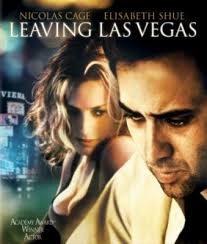
LEAVING LAS VEGAS
US, 1995, 111 minutes, Colour.
Nicolas Cage, Elisabeth Shue, Julian Sands, Richard Lewis, Stephen Webber, Carey Lowell, Danny Houston, Lou Rawls, Xander Berkely, Ed Lauter, R. Lee Ermey, Laurie Metcalfe.
Directed by Mike Figgis.
A really pessimistic film (again about life and death in Las Vegas).
Based on an autobiographical novel by John O'Brien (who committed suicide during the film's production), it is the story of a young alcoholic with a death wish. He leaves his job and goes to Las Vegas to drink himself to death in a month. He does find a friend, a prostitute played with depth by Elisabeth Shue. Nicolas Cage won an Oscar and many awards for his portrayal of the alcoholic.
This is an intense film, a film that asks us to look at an alcoholic and try to understand, especially since he does not want to be rescued. If this man were dying of cancer, people would want to be around to help and comfort. Alcoholism is a disease that people want to avoid. How can one be compassionate towards an alcoholic?
Not a film you would say you would like, nor do I suggest that you must see it. But there is a place for films tackling the underside of our society, challenging us.
1. The many awards, the Oscar for Nicolas Cage? A film of the 90s?
2. The work of the director, his writing and directing this film, his experimental films and drawing on this?
3. The strong cast, the Oscar, the nominations?
4. The themes of alcohol and drinking? A serious portrait? Alcoholic behaviour, attitudes, the reasons and motivations? The death wish? The need for support? Self-destruction?
5. The world of prostitutes and pimps, the work, the clients, the money, the risks and the violence, the women being used, yet making their choices? Becoming what the client wants? The physical abuse? It are personal life and needs?
6. Nicolas Cage as Ben, the opening with him shocking shopping, buying the drinks, his collapse? His wife leaving him, taking his son? In need of money, going to the restaurant, meeting his friends, wanting to borrow, the clash with him, his being ousted, promise of repayment, going to the bar, his talking with the girl at the bar, the attitude of the bartender, his bravado? The flashbacks, seeing him as a writer, jovial in the office, with the bosses, there are challenging him about the drink, his reaction, chaos in his life, fired? His burning his material? Wanting to cash the cheque, the girl at the counter, her hard line, his return?
7. Driving to Las Vegas, stocking up with drink, Sera? They’re talking? Going to the hotel, dingy, settling into the room, going out and around in Las Vegas, finding Sera in the street? Her not want him to offer money in the street because of the police? Their driving, talking, the agreement about the payment, going to his room, his talking, sleeping?
8. Sera, seeing her with Yuri, his Latvian background, the pimp, the group sex, his own sex with Sera,his demanding her money when she did not bring enough, seeing him later, the fear of attack, his leaving?
9. The hotel, the clerks, the owners and receiving Sera and Ben, at the pool, their being loud, excluded?
10. The gallery of minor characters and top actors: the bank teller, the thugs on the road to Vegas, the girl at the bar, Yuri, taxi drivers, the proprietors of hotels and boarding houses?
11. Ben, his talk, is intending to die, and enough money for the four weeks, taking Sera for the meal, walking around the city, moving in, their sharing, the possibilities of a relationship? They’re going to the casino, his gambling, the attack, his collapse? Sarah seeing the girl in the apartment and walking out, kicking him out?
12. Ben, by himself, lying at the gate, in the room, physically going down, his death? Her support of him?
13. Sera, the scenes of interview with the psychologist? Explanations of herself, her profession, her conducting herself, the attraction to Ben, being able to talk with him? Her future?
14. A sombre and all-too-realistic portrait of a desperate alcoholic?
Published in Movie Reviews
Published in
Movie Reviews
Tagged under